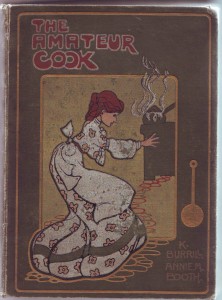The first in our ‘Favourite Finds’ series looks at cake – a staple in every workplace. Claire Wooldridge, UMASCS Graduate Trainee, elaborates.
It will be thought very odd, I doubt not by each little boy and girl, into whose hands this book shall fall, that a Banbury Cake should be able to write (as it were) its own life… but… many strange things happen every day – I shall therefore, without more words to the bargain, proceed in my story…

The History of a Banbury Cake (CHILDREN’S COLLECTION–828.7-HIS)
In anticipation of today’s #MusCake theme, it soon became clear to we of the special collections library team that delicious cake temptation runs through our collections like the jam in a Swiss roll. Featured below are just a few items from our MERL library and special collection rare books that will surely delight all cake lovers. Talking Banbury cakes are just the beginning!
The extraordinary Banbury cake (much like an Eccles cake) quoted above is the subject of The history of a Banbury cake: an entertaining book for children, published in 1835. This book is a real treasure of our children’s collection. The miniature 11x7cm text with its original blue paper binding (with pictorial covers) has been preserved inside a larger, modern casing.

The History of a Banbury Cake (CHILDREN’S COLLECTION–828.7-HIS)
The delightful tale of a talking and kindly Banbury cake documents its sale and subsequent journey from Oxford to Bristol. Before meeting its end by ‘falling prey to Billy’, the cake imparts moral and behavioural advice to its ‘little readers’, so that they will be ‘respected and beloved by all who know you’. A cake with a message indeed!

The Amateur Cook (RESERVE–641.5942-BUR)
Lamenting the ‘austere and solemn severity of demeanour’ of contemporary cook books, The Amateur Cook by K Burrill and Annie M Booth, published in 1905, is another title which features cakes, bakes and cookery in an unusual and intriguing manner. The writers hope to inject a more ‘frivolous spirit’ into printed works on cookery and baking, to address the production of dull and complicated cookery titles of which they saw ‘no end’. This is achieved through an unusual format; the text takes the form of a narrative intermingled with recipes, in which the protagonists, well-to-do early twentieth century ladies, are instructed in baking and cookery. In the chapter ‘Triumphant Teas’, the young ladies are instructed by their tutor, Delecta, on cakes and baking while trying to avoid falling asleep… ‘You told me, Lesbia, your cakes were often wrong. Now do try and look interested, like a good girl, while I read you some notes on cake making…’

The Amateur Cook – ‘ever ready to eat up my failures’! (RESERVE–641.5942-BUR)
The Amateur Cook is illustrated in a wonderful art nouveau style, on the cover and throughout the book. Many of the illustrations are intended to tie in with the comical nature of the book, such as the pictorial end papers which feature a woman feeding to a dog one of her culinary attempts with the caption ‘ever ready to eat up my failures’! As Delecta would say, ‘it is far easier to make than bake!’

Modern Cookery – chapter on cakes (RESERVE–641.5-ACT)
Eliza Acton was an early nineteenth century cook who wrote one of the first books on cookery featuring lists of ingredients, timings and instructions to produce a recipe book similar to today’s format. The well known Mrs Beeton’s Book of Household Management (first published in 1861) was largely based on Acton’s work. We hold the revised and enlarged edition of Acton’s Modern Cookery for Private Families published in 1875 (first published in 1845).
In Acton’s revised edition, her position on cakes and consumption of cake is laid bare (those who like to believe cake can do no wrong, avert your eyes!). She wishes that the space allotted to ‘sweet poisons’ in this edition had been ‘diminished still further’ due to the ‘illness’ the ‘habitual indulgence’ of rich buttery cakes can cause. Acton does concede, however, that occasional consumption of simple buns, biscuits and cakes is ‘not unwholesome’… some good news for cake lovers at least!
Our MERL Library periodical holdings feature several twentieth-century titles relating to cakes, confectionary and baking – ripe to be utilised by investigators of social, domestic and cultural history, alongside of the baking industry itself.
These titles often span the twentieth century, taking in resourceful baking methods to negate the impact of food rationing and how imperial and national achievements were celebrated through the medium of cake, such as victory fruit cakes in 1945 and a ‘polar cake’ to mark exploration in 1910.
Our Milling and Baking collection, alongside the titles of the open access MERL library, are ideal for those interested in researching baking in its industrial or scholarly context.
For those with a sweet tooth, there are many more cake and baking references to be found within our collections beyond these highlighted for museum cake day, 19 June.











